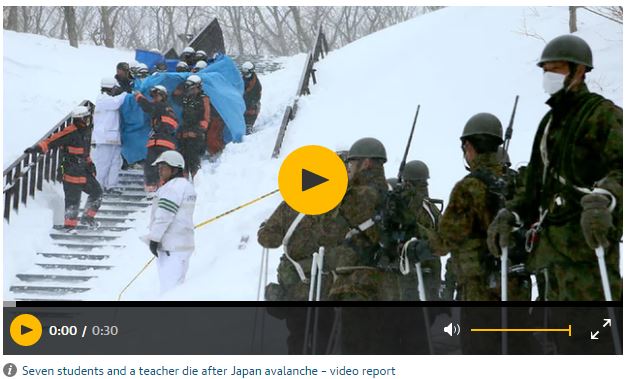More than 40 injured after avalanche struck while students were climbing near Nasu Onsen ski resort north of Tokyo
Seven high school students and a teacher have died and more than 40 people have been injured after an avalanche hit ski slopes in Japan.
A total of 52 students and 11 teachers from seven high schools were taking part in a three-day mountaineering expedition near the Nasu Onsen resort, 93 miles (150km) north of Tokyo, when the incident occurred at about 9.20am (00.20am GMT) on Monday.
Seven students and one teacher were found with no vital signs, rescue officials said. Of the many others who were injured, two students were believed to be in a serious condition.
“I cannot have peace of mind until I see the students’ faces,” the deputy headteacher of one of the affected schools told the Yomiuri newspaper.
Japan’s self-defence force was asked to help with the disaster response, which was at times hampered by weather conditions. The prime minister, Shinzō Abe, said the government would ensure the rescue was a top priority.
The avalanche followed heavy snowfall overnight. More than 1ft (30cm) of snow accumulated in the Nasu highlands between midnight and 9am, according to Japan Meteorological Agency data.
One unidentified student told the broadcaster NHK by telephone that there was a strong wind and he could see a white mass heading towards him. An instructor said to get down and then everyone was engulfed, he said.
As the scale of the tragedy came to light, questions were raised about whether it could have been prevented. A police inquiry has been opened, the Kyodo news agency reported.
Official avalanche advisories were in force in the area at the time. It is understood that climbing was stopped on the final day due to bad weather and the students instead participated in an exercise to wade through deep snow.
The head of the high school athletics league that organised the course, Kenichi Hashimoto, said he had respected the assessment of the experienced teachers who were on the scene. He conceded that “a stronger crisis management system was necessary”.
“Naturally, I would like to express my sympathies from the bottom of my heart,” Hashimoto told reporters at a press conference on Monday evening.
Robert Speta, a meteorologist for NHK World, said Tochigi prefecture had experienced an increase in unusual snow in recent days despite it being late March. This snow combined with rising temperatures increased the avalanche risk, he said.
“Typically it tapers off in late March, the snowpack settles and it’s OK for climbing and off-piste skiing, but just recently we had this big spike in the snow depth,” Speta said.
“We had heavy snow that condensed [with the warmer weather] and then once you have somebody on top of that, that creates a trigger. These are all a recipe for avalanche creation.”
The Nasu Onsen family ski resort, which has two lifts and one rope-tow, ended its ski season on 20 March.
The climbing trip reportedly began on Saturday and involved students from seven high schools along with instructors. Monday’s activities had been due to end about two-and-a-half hours after the avalanche struck.
In a separate incident in neighbouring Fukushima prefecture, a 70-year-old man was found unconscious after an avalanche on Monday afternoon. He had been climbing Mount Adatara with a 64-year-old man who was unhurt, NHK reported.
